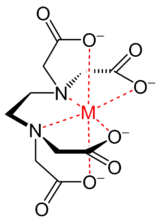- Chelate
-
Die Bezeichnung Chelatkomplexe – oder auch verkürzt als Chelate bezeichnet – steht für Komplexverbindungen, bei denen ein mehrzähniger Ligand (besitzt mehr als ein freies Elektronenpaar) mindestens zwei Koordinationsstellen (Bindungsstellen) des Zentralatoms einnimmt. Der Ligand heißt in diesem Fall Chelator (griech. Χηλή, chele für „Krebsschere“[1]). Beim Zentralatom handelt es sich meistens um ein zweifach positiv geladenes Metallion (etwa Fe2+, Cu2+). Liganden und Zentralatom sind über koordinative Bindungen verknüpft. Das bedeutet, das bindende Elektronenpaar wird allein vom Liganden bereitgestellt.
Chelatkomplexe sind stabiler als gleiche Komplexe mit einzähnigen, nicht untereinander verknüpften Liganden. Dieser „Chelat-Effekt“ hat zwei Ursachen. Zum einen ist die Entropieabnahme bei der Komplexbildung geringer, was einen thermo-dynamischen Stabilisierungseffekt hat. Im obigen Beispiel bildet sich aus zwei Teilchen ein Komplex. Im Falle von nichtchelatisierenden Liganden würden sich sieben Teilchen zu einem Komplex verbinden. Zum anderen kann ein Chelatligand sich erst nach Auflösung aller Bindungen vom Zentralatom entfernen, was bedeutet, dass Chelator viel schlechter vom Metallion dissoziieren kann. Damit sind Chelatkomplexe stabiler als Komplexe mit einzähnigem Liganden. Damit steigt ebenfalls die Wahrscheinlichkeit der sofortigen Rekombination nach der Spaltung.
Als Beispiele dafür finden sich in der Natur etwa das Hämoglobin, das Chlorophyll oder Vitamin B12. Wichtig in der Medizin ist im Rahmen einer Chelat-Therapie z. B. das EDTA (Ethylendiamintetraacetat).
Siehe auch
Einzelnachweise
- ↑ Wolfgang Forth, Dietrich Henschler, Walter Rummel: Allgemeine und spezielle Pharmakologie und Toxikologie. Erstauflage: Bibliographisches Institut 1975.
Wikimedia Foundation.

